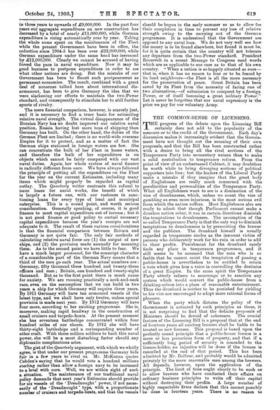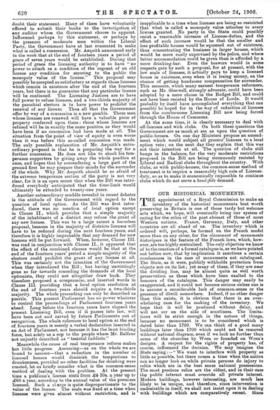THE COMMON-SENSE OF LICENSING.
THE progress of the debate upon the Licensing Bill certainly does not add to the popularity of the measure or to the credit of the Government. Each day's discussion makes it increasingly evident that the Govern- ment have not thought out the meaning of their own proposals, and that the Bill has been constructed rather with a desire to bring all the rival sections of the Temperance Party into momentary unison than to make a solid contribution to temperance reform. From the point of view of an embarrassed Cabinet, it may doubtless be worth while to bring diverging sections of political supporters into line ; but the leaders of the Liberal Party make a mistake if they imagine that the great body of Englishmen are really much concerned with the peculiarities and personalities of the Temperance Party. What all Englishmen want to see is a diminution of the vice of drunkenness, which, unless we count the vice of gambling as even more injurious, is the most serious evil from which the nation suffers. Most Englishmen also are ready to admit that though Parliament cannot make a drunken nation sober, it can in certain directions diminish the temptations to drunkenness. The assumption of the so-called Temperance Party is that the only way to diminish temptations to drunkenness is by persecuting the brewer and the publican. The drunkard himself is usually regarded in temperance circles as the innocent victim of persons who deliberately work for his ruin in order to add to their profits. Punishment for the drunkard rarely finds any place in temperance programmes, and it still seems to be assumed that the man who is so feeble that he cannot resist the temptation of passing a. public-house is nevertheless to be entitled to retain a vote which gives him a voice in controlling the destinies of a great Empire. In the same spirit the Temperance Party utterly refuses to encourage or to sanction any system which would convert the public-house from a drinking-saloon into a place of reasonable entertainment. Thus the drunkard is neither to be punished for yielding to his vice nor encouraged to adopt more rational forms of pleasure. When the party which dictates the policy of the Government is actuated by such principles as these, it is not surprising to find that the definite proposals of Ministers should be devoid of coherence. The crucial feature of the Licensing Bill is a proposal that at the end of fourteen years all existing licenses shall be liable to be treated as new licenses. This proposal is based upon the perfectly sound principle that a public-house license is a more or less precarious form of property, and that if a sufficiently long period of security is conceded to the license-holder, no injustice will be done if the license is cancelled at the end of that period. This has been admitted by Mr. Balfour, and probably would be admitted privately by the more reasonable men among the brewers. All depends, however, upon the application of the principle. The limit of time ought clearly to be such as to allow brewers who have conducted their affairs on ordinary business principles to write off their capital without destroying their profits. A large number of highly respectable firms declare that this cannot possibly be done in fourteen years. There is no reason to doubt their statement. Many of them have voluntarily offered to submit their books to the investigation of any auditor whom the Government choose to appoint.
Influenced perhaps by this statement, or perhaps by the pressure of moderate men within the Liberal Party, the Government have at last consented to make what is called a concession. Mr. Asquith announced early in the week that at the end of fourteen years a period of grace of seven years would be established. During that period of grace the licensing authority is to have "no power to attach as a condition of the regrant of an old license any condition for securing to the public the monopoly value of the license." This proposal may possibly be accepted as satisfactory as regards those licenses which remain in existence after the end of the fourteen years, but there is no guarantee that any particular license will be continued. The Licensing Justices are to have full power to refuse licenses, and a two-thirds majority of the parochial electors is to have power to prohibit the renewal of any license. Thus all that the Government offer by way of a concession is a new gamble. Those men whose licenses are renewed will have a valuable piece of property conferred upon them : those whose licenses are refused will be in exactly the same position as they would have been if no concession had been made at all. The situation from the point of view of equity is even worse than it was before this so-called concession was made. The only possible explanation of Mr. Asquith's extra- ordinary proposal is that he is preparing the way for a further concession. He does not like to shock his tem- perance supporters by giving away the whole position at once, and hopes that by surrendering a large part of the ground first he may prepare their minds for the surrender of the whole. Why Mr. Asquith should be so afraid of the extreme temperance section of the party is not very clear, for it is an open secret that when the Bill was intro- duced everybody anticipated that the time-limit would ultimately be extended to twenty-one years.
Another extraordinary muddle revealed in recent debates is the attitude of the Government with regard to the question of local option. As the Bill was first intro- duced, there was no mention of local option except in Clause II., which provides that a simple majority of the inhabitants of a district may refuse the grant of any new license. This was to a, large extent a harmless proposal, because in the majority of districts licenses will have to be reduced during the next fourteen years, and therefore it is highly improbable that any demand for new licenses will be put forward. When, however, Clause III. was read in conjunction with Clause IL, it appeared that the effect of the combined clauses would be that at the end of the fourteen years' period a simple majority of the electors could prohibit the grant of any license at all. This was certainly not the intention of the Government when they introduced the Bill ; but having unwittingly gone so far towards conceding the demands of the local optionists, they could not altogether draw back. They therefore proposed a compromise, and inserted words in Clause III. providing that a local option resolution at the end of fourteen years should require a two-thirds majority. The whole proceeding can only be described as puerile. This present Parliament has no power whatever to control the proceedings of Parliament fourteen years ahead. Long before the fourteen years have elapsed the present Licensing Bill, even if it passes into law, will have been cut and carved by future Parliaments out of recognition. The whole reference to local option at the end of fourteen years is merely a verbal declaration inserted in an Act of Parliament, not because it has the least binding force, but solely as a sop to the people whom Mr. Balfour not unjustly described as "teetotal faddists."
Meanwhile the cause of real temperance reform makes but little progress. Assuming—as on the whole we are bound to assume—that a reduction in the number of licensed houses would diminish the temptations to drunkenness, provided no other facilities for drinking were created, let us briefly consider what is the common-sense method of dealing with the problem. At the present time a publican's license costs from .P.,4 10e. a year up to £60 a year, according to the annual value of the premises licensed. Such a clarge is quite disproportionate to the value of the license. The scale was fixed at a time when licenses were given almost without restriction, and is inapplicable to a time when licenses are being so restricted that what is called a monopoly value attaches to every license granted. No party in the State could possibly resist a reasonable increase of License-duties, and the effect of such increase would be that the smaller and less profitable houses would be squeezed out of existence, thus concentrating the business in larger houses, which would be more easily supervised by the police, and where better accommodation could be given than is afforded by a mere drinking-bar. Even the brewers would in some respects gain by such a proposal, for at present, with the low scale of licenses, it actually pays to keep a licensed house in existence, even when it is losing money, on the chance of getting handsome compensation for surrender. This measure, which many earnest temperance reformers, such as Mr. Sherwell, strongly advocate, could have been adopted by a mere clause in the Budget Bill, and could not have been resisted by the House of Lords. It would probably by itself have accomplished everything that can possibly be hoped for in the way of reduction of licenses from the cumbersome Licensing Bill now being forced through the House of Commons.
At the same time, it is clearly necessary to deal with off-licenses and with clubs. On both these questions the Government are as much at sea as upon the question of public-houses. On one day Ministers propose an amend- ment which would subject all grocers' licenses to a local option veto; on the next day they explain that this was not their intention at all. The question of clubs still bangs in the balance, for the very moderate restrictions proposed in the Bill are being strenuously resisted by Liberal and Radical clubs throughout the country. With clubs, as with public-houses, the common-sense method of treatment is to require a reasonably high rate of License duty, so as to make it economically impossible to continue clubs which do not serve a bond-fide demand.















































 Previous page
Previous page